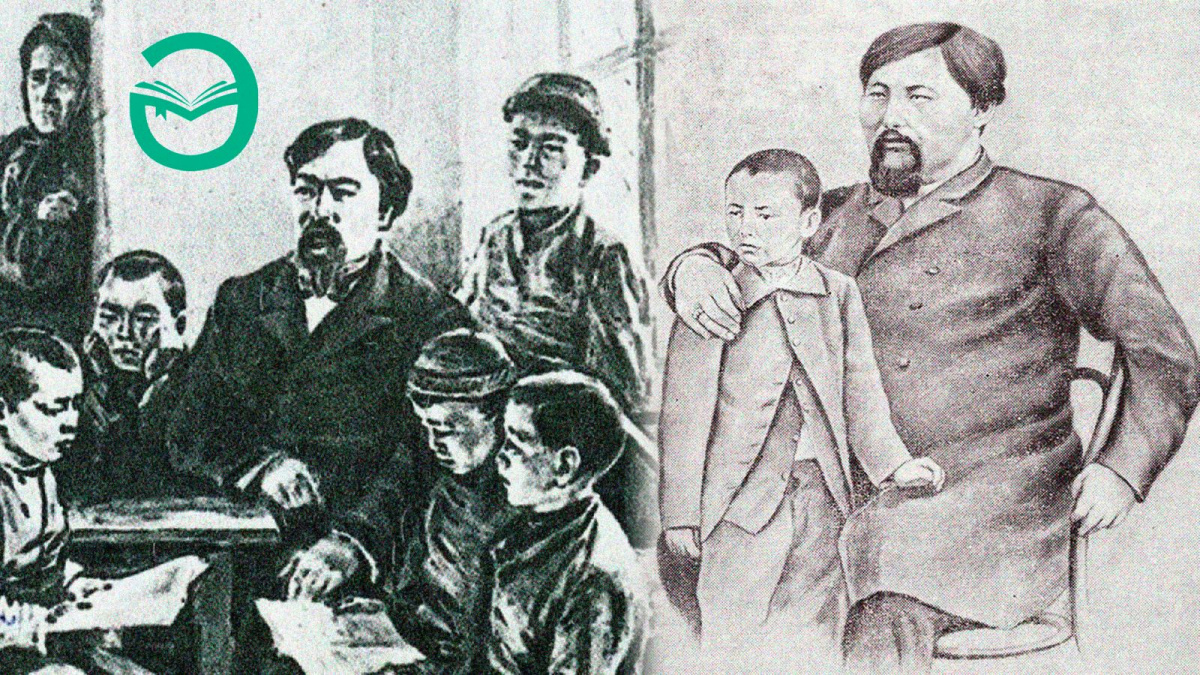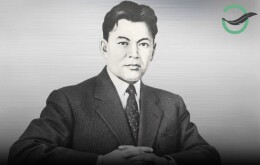One of the most prominent figures in Kazakh history, Ybyrai (Ibrahim) Altynsarin, dedicated his life to encouraging Kazakh children to attend school and pursue education. He worked tirelessly as a teacher to provide knowledge to his people. Beyond writing literary works, he authored pedagogical and ethnographic studies, serving as a guide not only for children but also for teachers. In addition to fostering literacy among children, Altynsarin played a crucial role in shaping their moral character and helping them grow into virtuous and responsible citizens. His instructive poems and brief yet impactful stories contributed to the spiritual enrichment of the people and the cultivation of human virtues.
Ybyrai Altynsarin translated short stories and fables by Russian educators (such as K.D. Ushinsky and I.I. Paulson) and writers (like L.N. Tolstoy and I.A. Krylov), adapting them to fit Kazakh culture and worldview. Inspired by these works, he created original stories in Kazakh, often incorporating moral lessons and advice. Recognizing that "education without morality is humanity’s worst enemy," Altynsarin’s writings focus on three main themes: first, encouraging children to pursue education; second, fostering an appreciation for labor and craftsmanship; and third, instilling values of morality and civility, urging students to grow into cultured individuals.
Ybyrai Altynsarin vividly highlights the darkness of ignorance and the immense benefits of literacy and education in his famous poem "Come, Children, Let’s Learn". Similarly, his poem "Nations with Knowledge and Art", written over a century and a half ago, remains highly relevant today. In this work, the poet emphasizes how foreign nations, by valuing education and innovation, have improved their lives and live in prosperity through relentless learning and effort.
Even in the modern world, it is evident that countries with advanced science and education systems enjoy better living conditions and health standards compared to those lagging in education. Recognizing this phenomenon in his time, Ybyrai dedicated himself to educating Kazakh youth. His commitment to the idea of education is reflected not only in the fables he translated from Russian anthologies but also in the short stories he authored, which subtly instill these values in readers through the actions and words of his characters. For instance, in the story "Luqman the Governor", a situation arises where a mullah, holding the mistaken belief that practicing medicine is sinful and opposes divine will, is confronted by Luqman’s response. This interaction effectively guides readers toward a rational understanding, challenging outdated views and reinforcing the importance of knowledge and critical thinking. To acquire knowledge, one needs determination, patience, and diligence. Ybyrai Altynsarin deeply understood that merely reading books would not suffice to improve one’s life; one must apply that knowledge and work hard. This is why many of his stories focus on instilling a work ethic in both the younger generation and the wider public. Take, for instance, the story "Father and Son". Through a realistic depiction of a father and son’s experience, the narrator conveys the moral: "If you shirk small tasks, you will face great burdens; if you are not content with little, you may end up with nothing at all." Similarly, in the story "The Spider, the Ant, and the Swallow", the author draws attention to the tireless efforts of every creature on earth to sustain itself, reminding readers that humans, too, should not remain idle but work diligently.
Of course, constant learning and tireless effort require perseverance. Altynsarin demonstrates that setting a goal and achieving it can be learned by observing the world around us, as illustrated in his story "Satemir Khan". The tale narrates how a young orphan, Satemir, watches an ant repeatedly attempt to climb to the top of a wall. Despite stumbling and falling, the ant ultimately reaches its goal. Inspired, Satemir reflects: "Even the smallest of God’s creatures, this ant, tirelessly works toward its goal. Despite being lame, it perseveres and ultimately succeeds. Watching this, I realize how foolish I have been to avoid striving for ambition or working hard." This realization encourages readers, especially young ones, to see that persistence and effort can overcome any obstacle and lead to success.
Other works by Altynsarin also promote the values of labor and craftsmanship. For instance, the contrast between a poor boy accustomed to hardship and self-reliance and a wealthy boy who lacks appreciation for hard work is vividly depicted in "The Rich Man’s Son and the Poor Man’s Son". Similarly, "How to Earn a Living" tells the story of a beggar who turns to honest labor and achieves his goals, offering another compelling example of the transformative power of diligence and perseverance.
On March 16, 1864, Ybyrai Altynsarin wrote about his students: “In short, after completing the four-year course, these youths will be able to speak and write reasonably well. I will also make every effort to influence their moral character to ensure they do not become corrupt later in life.” True to his word, Altynsarin dedicated himself tirelessly to shaping Kazakh youth into morally upright and spiritually enriched individuals. For this reason, he chose themes of kindness, compassion, love for one’s homeland, and respect for parents as the foundation of his works.
For instance, in the story "Mother and Child," he encourages readers to be compassionate and to care equally for both humans and animals. The mother’s words, “If you want to be able to do more good, you must take care of everything,” highlight the importance of qualities such as attentiveness and frugality. Similarly, the story "A Dog Named Polkan" uses the example of a loyal dog to convey the message that one should treat those weaker than themselves with kindness and respect, rather than disdain. Stories such as "The Golden Needle," "Using Livestock for Good," "The Benefits of Knowledge," "Care Is Stronger Than Illness," and "Negligence" are filled with moral lessons. These works introduce readers to principles of humanity and inspire them to strive for inner beauty.
Ybyrai Altynsarin deeply understood that the kind of person a child grows up to be depends directly on the upbringing they receive. In his story "Orchard Trees," he addresses children with the following advice: “If I correct your mistakes and teach you useful skills, and if you listen to me and put them into practice, you will grow up to be a good and upright person. But if you are left unchecked, you will grow as crooked as this tree.”
The practice of instilling virtues in children through parables, fables, and stories has long been a part of Kazakh pedagogical tradition. Altynsarin successfully combined the demands of modern education with centuries-old Kazakh methods of child-rearing. He remains a pivotal figure in the spiritual life of the Kazakh people, bridging traditional values and contemporary educational principles.












